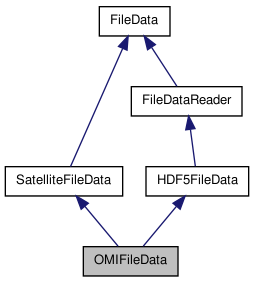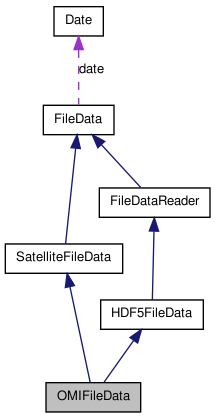

Public Member Functions | |
| OMIFileData (const string &_name, const string &mode="r") | |
| Constructor. | |
| ~OMIFileData () | |
| Destructor : | |
| const bool | get_index (const float &lat, const float &lon, const double &time, int *near_point_idx, const float coloc_tolerance=OMIFileData::colocation_tolerance) |
| search the index of the nearest point in the data to (lat , lon ) If coloc_tolerance is given, it will compute only the distance of the points that have a distance to ( lat, lon ) inferior to coloc_tolerance | |
| const int | get_nearest_point_index (const float &lat, const float &lon, const double &time) |
| const bool | contains_data_at (const float &lat, const float &lon, const double &time) const |
| void | load_geolocation_data () |
| const bool | get_index (const float &lat, const float &lon, int &nearest_pix_idx, const float colocation_tolerance=OMIFileData::colocation_tolerance) |
| find the index of the nearest point to (lat,lon) in the data. If (lat,lon) is not found or out of the colocalisation_frame, returned indexes are [-1,-1] | |
| const float | get_nearest_point_distance (const float &lat, const float &lon, const float coloc_tolerance=OMIFileData::colocation_tolerance) |
| compute the distance to (lat,lon) of the nearest point in the data If coloc_tolerance is given, it will compute only the distance of the points that have a distance to ( lat, lon ) inferior to coloc_tolerance | |
| const bool | contain_location (const float &lat, const float &lon, const double &tolerance=OMIFileData::colocation_tolerance) |
| check if this file has eventually data coincident with (lat,lon) Actually, it only tests if (lat,lon) is contained in the data's bounding rectangle. | |
| const bool | contain_data (const float &lat, const float &lon, const double &time, const double &colocation_tolerance=OMIFileData::colocation_tolerance) |
| check if the file has possible (lat,lon) coincidence | |
| virtual void | get_pixel_coord (const vector< int > &ipix, float &lat, float &lon, double &time) |
| retrieve the coordinates of a pixel using its index | |
| virtual void | get_vindex (vector< vector< int > > &v_index, const float &lat, const float &lon, const float colocation_tolerance) |
| build the list of indices of pixels that are in colocation tolerance, sorted by increasing distance to (lat,lon) If (lat,lon) is not found or out of the colocalisation_frame, returns an empty vector | |
| void | load_v_pixel () |
| virtual void | close_data_file () |
| closes the file. | |
| virtual void | open_data_file () |
| opens the file. | |
| const int | get_sz_x () const |
| accessor to the geolocation datasets swath size (in pixels) | |
| const int | get_sz_y () const |
| accessor to the geolocation datasets along track size (in pixels) | |
Protected Member Functions | |
| void | init () |
| void | check_filename (const string &short_filename) const |
| void | parse_filename (const string &short_filename) |
Protected Attributes | |
| int | track_size |
| vector< int > | lat_lon_index_max |
Static Protected Attributes | |
| static const string | latitude_sds_name = "Latitude" |
| static const string | longitude_sds_name = "Longitude" |
| static const string | time_sds_name = "Time" |
| static const float | colocation_tolerance = 0.05 |
Constructor & Destructor Documentation
| OMIFileData::OMIFileData | ( | const string & | _name, | |
| const string & | mode = "r" | |||
| ) |
Constructor.
- Parameters:
-
_name the name (path+filename) of the file to be opened mode the opening mode. LIMITATION : only "r" mode treated at this time
Member Function Documentation
| const bool OMIFileData::contain_data | ( | const float & | lat, | |
| const float & | lon, | |||
| const double & | time, | |||
| const double & | colocation_tolerance = OMIFileData::colocation_tolerance | |||
| ) | [virtual] |
check if the file has possible (lat,lon) coincidence
- Warning:
- it's an EVENTUAL coincidence. That is not a proof !!!
- Parameters:
-
lat latitude lon longitude time time colocation_tolerance the acceptable bias (in km or degrees. Supposed to be in, a plane approximation) between [lat,lon] and the nearest data point.
- Returns:
- true if can eventually contain a coincidence with the point.
- Warning:
- at this time always true. I don't have a good way to do it
Reimplemented from FileData.
References contain_location(), and FileData::contain_time().
| const bool OMIFileData::contain_location | ( | const float & | lat, | |
| const float & | lon, | |||
| const double & | tolerance = OMIFileData::colocation_tolerance | |||
| ) | [virtual] |
check if this file has eventually data coincident with (lat,lon) Actually, it only tests if (lat,lon) is contained in the data's bounding rectangle.
- Parameters:
-
lat the latitude of the event lon the longitude of the event tolerance acceptable bias between the nearest point in the data and the given (lat,lon) point
- Returns:
- true if a point in the data has been found in the colocation frame
Reimplemented from FileData.
References colocation_tolerance, and get_index().
Referenced by contain_data().
| const bool OMIFileData::contains_data_at | ( | const float & | lat, | |
| const float & | lon, | |||
| const double & | time | |||
| ) | const [inline] |
check if this file has data coincident with (lat,lon,time)
- Parameters:
-
lat the latitude of the event lon the longitude of the event time the time of the event
- Returns:
| const bool OMIFileData::get_index | ( | const float & | lat, | |
| const float & | lon, | |||
| int & | nearest_pix_idx, | |||
| const float | colocation_tolerance = OMIFileData::colocation_tolerance | |||
| ) |
find the index of the nearest point to (lat,lon) in the data. If (lat,lon) is not found or out of the colocalisation_frame, returned indexes are [-1,-1]
- Parameters:
-
lat the latitude lon the longitude nearest_pix_idx the index of the nearest measure. -1 if no coincidence found. colocation_tolerance the acceptable bias (in km or degrees. Supposed to be in, a plane approximation) between [lat,lon] and the nearest data point.
- Returns:
- true if the coincidence has been found
References get_index().
| const bool OMIFileData::get_index | ( | const float & | lat, | |
| const float & | lon, | |||
| const double & | time, | |||
| int * | near_point_idx, | |||
| const float | coloc_tolerance = OMIFileData::colocation_tolerance | |||
| ) |
search the index of the nearest point in the data to (lat , lon ) If coloc_tolerance is given, it will compute only the distance of the points that have a distance to ( lat, lon ) inferior to coloc_tolerance
- Parameters:
-
near_point_idx the indexes of the nearest point found (or {-1,-1} if not found) lat the latitude lon the longitude time the time of the observation. If -1., skipped coloc_tolerance the -/+ maximal tolerance for 2 points considered as colocated
- Returns:
- true if found
References SatelliteFileData::free_geolocation_data(), SatelliteFileData::is_geolocation_data_loaded(), load_geolocation_data(), and SatelliteFileData::v_pixel.
Referenced by contain_location(), get_index(), and get_nearest_point_distance().
| const float OMIFileData::get_nearest_point_distance | ( | const float & | lat, | |
| const float & | lon, | |||
| const float | coloc_tolerance = OMIFileData::colocation_tolerance | |||
| ) |
compute the distance to (lat,lon) of the nearest point in the data If coloc_tolerance is given, it will compute only the distance of the points that have a distance to ( lat, lon ) inferior to coloc_tolerance
- Parameters:
-
lat the latitude lon the longitude coloc_tolerance the -/+ maximal tolerance for 2 points considered as colocated
- Returns:
- the distance to the nearest point, or -1 if no point in the colocalisation frame has been found.
References SatelliteFileData::free_geolocation_data(), get_index(), SatelliteFileData::is_geolocation_data_loaded(), SatelliteFileData::lat_data, load_geolocation_data(), and SatelliteFileData::lon_data.
| const int OMIFileData::get_nearest_point_index | ( | const float & | lat, | |
| const float & | lon, | |||
| const double & | time | |||
| ) |
find the row index of the nearest point in the data of this file to (lat,lon,time). Be careful, it will return a valid index : this method doesn't check if the point given in parametre is contained in this file. Use the contains_data_at to check it first.
- Parameters:
-
lat the latitude of the event lon the longitude of the event time the time of the event
- Returns:
- the nearest point row index
References SatelliteFileData::free_geolocation_data(), SatelliteFileData::is_geolocation_data_loaded(), SatelliteFileData::lat_data, load_geolocation_data(), and SatelliteFileData::lon_data.
| virtual void OMIFileData::get_pixel_coord | ( | const vector< int > & | ipix, | |
| float & | lat, | |||
| float & | lon, | |||
| double & | time | |||
| ) | [inline, virtual] |
retrieve the coordinates of a pixel using its index
- Parameters:
-
ipix [IN] index of the pixel lat [OUT] latitude of the pixel lon [OUT] longitude of the pixel time [OUT] timestamp of the pixel
| const int OMIFileData::get_sz_x | ( | ) | const [inline] |
accessor to the geolocation datasets swath size (in pixels)
- Returns:
- number of pixels along x dimension
| const int OMIFileData::get_sz_y | ( | ) | const [inline] |
accessor to the geolocation datasets along track size (in pixels)
- Returns:
- number of pixels along y dimension
| virtual void OMIFileData::get_vindex | ( | vector< vector< int > > & | v_index, | |
| const float & | lat, | |||
| const float & | lon, | |||
| const float | colocation_tolerance | |||
| ) | [inline, virtual] |
build the list of indices of pixels that are in colocation tolerance, sorted by increasing distance to (lat,lon) If (lat,lon) is not found or out of the colocalisation_frame, returns an empty vector
- Parameters:
-
lat the latitude lon the longitude colocation_tolerance the acceptable bias (in km or degrees. Supposed to be in, a plane approximation) between [lat,lon] and the nearest data point.
- Returns:
- the list of indices of pixels
| void OMIFileData::load_geolocation_data | ( | ) | [virtual] |
load the geolocations data. This method is used to make the search of the indexes of a (lat,lon,time) point faster.
Reimplemented from FileData.
References SatelliteFileData::is_geolocation_data_loaded(), SatelliteFileData::lat_data, SatelliteFileData::lon_data, HDF5FileData::read_data(), and SatelliteFileData::time_data.
Referenced by get_index(), get_nearest_point_distance(), and get_nearest_point_index().
Member Data Documentation
const float OMIFileData::colocation_tolerance = 0.05 [static, protected] |
default acceptable tolerance between 2 colocated measures
Referenced by contain_location().
The documentation for this class was generated from the following files:
- /home/pascal/depot/filedata/src/omifiledata.h
- /home/pascal/depot/filedata/src/omifiledata.cpp
 1.7.1
1.7.1